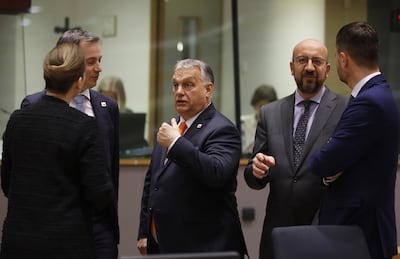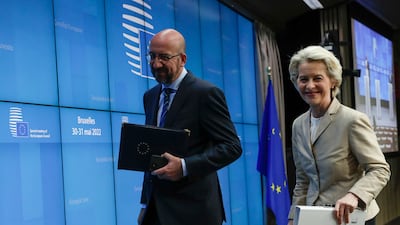European countries on Tuesday united behind a four-pronged strategy for the future that is designed to free their energy grids from Russia’s grip, ending a dependency on Moscow that has been a handicap in responding to the invasion of Ukraine.
Hours after agreeing a partial ban on Russian fossil fuel imports, the European Union adopted a plan to plug the gap by shopping elsewhere, producing more renewable energy, saving power and improving connections between energy-rich and import-reliant nations.
Ursula von der Leyen, the president of the European Commission, said she hoped to put some 300 billion euros ($321bn) of EU funding behind a blanket energy revamp stretching from Finland to Portugal.
In the short term, the EU’s 27 members will be encouraged to sign joint gas contracts — in a manner compared by officials to their common purchases of coronavirus vaccines.
But renewable energy “has the big advantage that it is not only good for the climate, but it is also good for our independence and good for our security of supply, and it creates jobs at home,” Ms von der Leyen said.
The outline strategy was agreed at the end of a two-day summit in Brussels dedicated to the war in Ukraine. Leaders also discussed food shortages arising from the conflict and the future of the European defence industry.
The summit’s main result, the embargo on Russian oil imports by sea, had languished in diplomatic stalemate for weeks because of the concerns of countries reliant on Russian fuel — especially Hungary.
Several leaders signalled on Tuesday that the EU would be reluctant to go charging back into that process to sanction gas, despite Ukraine’s demands, exposing the limits of what Europe can do given its close fuel links to Russia.
“We don’t want this fuel to be replaced by other fossil products,” Swedish Prime Minister Magdalena Andersson said after leaders finished haggling over a text on energy.
“Instead, we should increase the use of renewable solutions.”

Part one: Finding new oil and gas suppliers
The 11-page European Council conclusions said countries should, “as a short-term priority”, find oil and gas from suppliers other than a newly hostile Russia.
Russian gas exporter Gazprom is already blocking supplies to Poland, Bulgaria, Finland, the Netherlands and potentially Denmark, and Germany is among the countries preparing for potential power cuts.
Leaders said member states should move faster to fill their gas storage tanks before next winter and encouraged them to sign up to a joint purchasing platform also open to non-EU members including Ukraine.
The EU in March signed a deal with the US to import liquefied natural gas, and the bloc’s LNG imports from outside Russia are already double where they were at the start of 2021, Ms von der Leyen said.
Part two: Producing renewable energy at home
The war in Ukraine has given new momentum to renewable energy policies originally drawn up to reduce carbon emissions and tackle climate change.
Ms von der Leyen said renewables were the “most important pillar” of the wider energy revamp known as RePower EU, which calls for policies such as a doubling of solar panel capacity by 2025.
EU leaders said an expansion of renewable energy sources such as wind and solar would require immediate changes to planning laws so that new projects can quickly be approved.
They said a European renewables industry should be “underpinned by an industrial cluster” to develop the skills and supply chains for solar and wind, hydrogen, heat pumps and other technology.
Part three: Saving power
The European Commission says a third of the gas savings it hopes to make by 2030 could be achieved by not wasting energy.
“To save energy is of course a fundamental priority for all of us,” said European Council President Charles Michel.
The leaders’ recommendations were light on specifics but called on countries to “improve energy efficiency wherever possible”. The commission has proposed incentives such as tax cuts on energy-efficient heaters.
Countries have already begun taking measures to head off a potential energy crunch. Spain this month set a limit on the use of air conditioning in offices, while Germany has turned down the temperature in public swimming pools.
Part four: Sharing energy
The vision of EU leaders is “completing and improving the interconnection of European gas and electricity networks” so that nations rich with energy can help out their neighbours.
These should include both gas pipelines and electricity networks that could eventually be used to transmit hydrogen, the council said. Hydrogen is viewed with interest by sectors such as transport and heavy industry that cannot easily be electrified.
Spain and Portugal, which are relatively cut off from the European power grid in what officials have called an “energy island”, won an expression of interest from the EU in buying from their LNG and renewable-heavy networks.
New connections should include “taking advantage of the Iberian Peninsula’s potential to contribute to the security of supply,” the leaders said — without addressing Spain’s demand that they stump up some of the money.










































